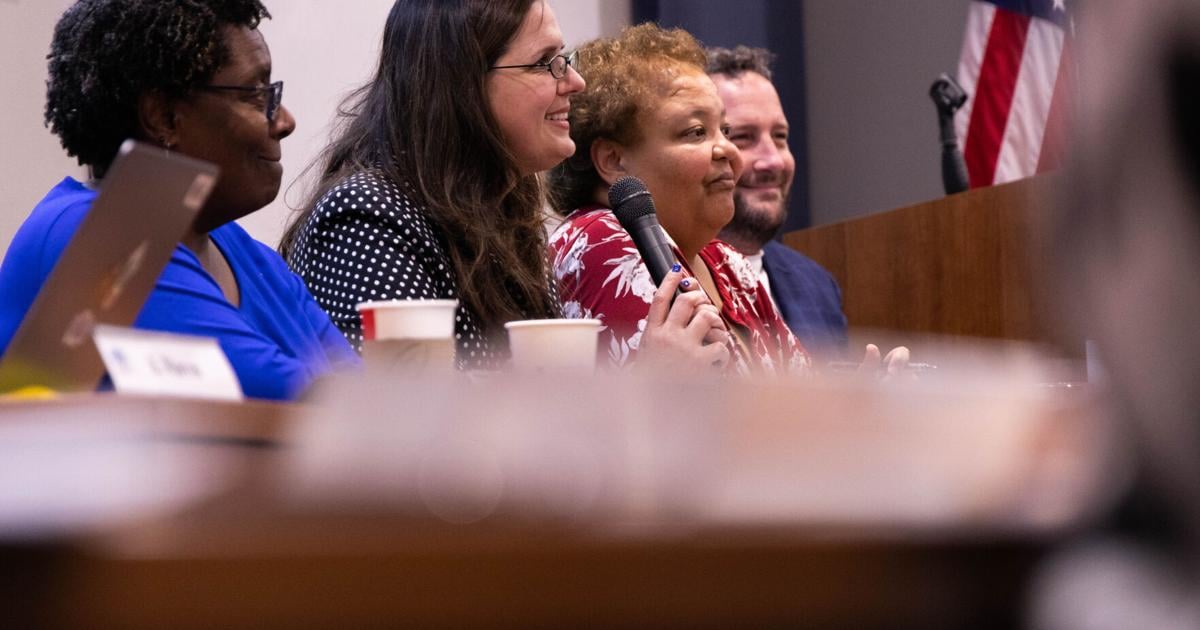President Jennifer Cowley answers questions during a Faculty Senate meeting Oct. 2, 2024, in the Student Government Chambers.
UTA is establishing an interim faculty advisory body as a replacement for the now-dissolved Faculty Senate, President Jennifer Cowley told The Shorthorn.
The new group — called Interim University Faculty Roundtable — will review policy changes and budget planning, engage with other faculty members and oversee four faculty working groups responsible for students’ academic experiences. The roundtable’s decisions are nonbinding.
In August, the UT System Board of Regents authorized university presidents to establish faculty advisory groups to replace faculty senates. The decision affects all 14 institutions within the system, including UTA.
The system is working to comply with a part of Senate Bill 37, a new law that shrinks the power of faculty senates by restructuring them or allowing existing ones to be abolished by Sept. 1.
Under SB 37, faculty senates are only permitted to function as advisory groups, and any proposed changes must be approved through an institution’s governing body, such as the UT System. Universities opting to keep their faculty senates have to adapt them to comply with the law.
Before its dissolution, Cowley tasked the Faculty Senate with nominating candidates for the new panel, she said. The group will include 12 faculty members from various departments with experience in shared governance.
UTA’s Faculty Senate had more than 70 faculty members, according to the group’s website.
Cowley said forming an interim advisory group provides a way to respond to faculty’s concerns. She cited a recent survey where faculty noted heavy workloads from serving on committees, volunteering or advising student organizations with little visible impact.
“For me, seeing this interim body, it’s an opportunity to have conversation with our faculty about whatever we design for the future, make sure that we’re addressing those concerns about having too much service and not the right ways to create impact,” Cowley said.
In a Sept. 5 co-signed email to faculty members, Cowley and Tamara Brown, provost and senior vice president for Academic Affairs, acknowledged that the structure cannot “fully replicate what came before” but said they believed that new changes will bring both questions and opportunities to make impact.
“How we work together must look different and take new forms,” the email reads. “But the values of faculty voice, leadership, and partnership will remain at the heart of UTA’s work.”
The advisory group will perform similar functions as a faculty senate or council to maintain an institution’s operations. For UTA, such duties have included pushes for standardized pay raises and for a continuation of the presidential search process after COVID-19, which led to the hiring of Cowley.
In recent weeks, the governing boards of University of North Texas and Texas Tech University modified their faculty senates to comply with state law.
Texas A&M and Texas State regents dissolved faculty senates, similarly to the UT System.
Faculty senates typically are the only group on campus where faculty representatives make recommendations after they have had conversations with students, staff and administrators, said Brian Evans, president of the Texas Conference of the American Association of University Professors, also speaking for himself.
Evans has concerns about faculty advisory groups falling under administrative control, but said they’re better than having no representative body.
“It’s going to be a muzzled voice of the elected faculty, but at least there’s some voice there,” Evans said.
The UTA Faculty Senate had always served in an advisory capacity, Cowley said. The university also had undergraduate and graduate assemblies that provided policy recommendations on curriculum and academic progress.
Those assemblies also officially dissolved under SB 37. Two committees — the Hearing Panel and the University Tenure and Promotion Committee — will be reconstituted as appointed bodies rather than elected.
The interim body will shape the future structure of a potential permanent faculty senate as UTA anticipates a regents’ ruling, Cowley said.
Kevin Eltife, UT System board chairman, said at the Aug. 21 meeting that regents will decide if and when faculty senates will be re-established on campuses and that they will proceed “deliberately.”
“We are going to take our time. We’re going to go slow. We’re going to figure out the best approach if we’re going to have these faculty senates on every campus or not,” Eltife said. “Some may not have them. We don’t know yet.”
@DangHLe

